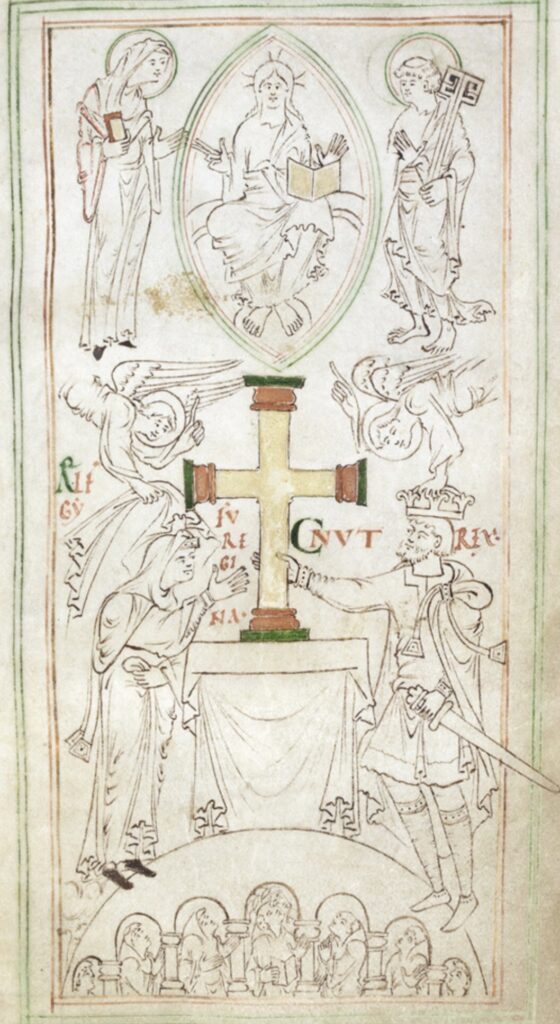
At times it is useful to reflect on how similar our troubles are to troubles our forebears suffered. When we can’t see our way to the bright future for which we yearn, it can be helpful to see how our forebears brought about their bright future, which we take for granted.
In 1000 AD there was no England.
Instead, the term used was Angelcynn, kin of the Angles, the Germanic peoples who hundreds of years earlier had conquered much of the territory of the island the Romans had called Brittania.
The problem was that by 1000 AD a large swath of the island of Brittania was occupied by Danes or people of Danish descent.[ref]This area was called the Danelaw and covered much of modern England north of London.[/ref] They had their own approach to law. They looked like Scandinavians, with blonde hair and fair skin.
King Æthelrede II had ascended to the throne in 978 as a twelve-year-old boy when his brother was murdered. Though the young King’s name meant “well advised,” he became known as a person who was ill-advised, Æthelrede the Unrede.
When the King of the Angelcynn (English) was a mature man, Danes attacked. Ill-prepared to defend his people, King Æthelrede was pressed to pay 10,000 Roman pounds of silver to get the Danes to stop the war. Yet independent Viking bands from the Scandinavian kingdoms still raided. King Æthelrede reportedly attacked Normandy in an attempt to deny the Danish raiders (Vikings) a friendly harbor near the shores of the Angelcynn. Without question, King Æthelrede married the sister of the Duke of Normandy in 1002, demanding that Normandy break off relations with Denmark.
Later that year, King Æthelrede ordered a massacre of leading Danes, apparently having them trapped in a hall in Oxford, stabbed and burned to death.[ref]This is known as the St. Brice’s Day massacre.[/ref] One of these was sister to the King of Denmark. From that time forward, King Æthelrede continued his campaign of suppressing and murdering those he did not consider to be Angelcynn.
In this milieu, an abbot near London was preaching love. Ælfric of Eynsham wrote “The love that loves God is not idle. Instead, it is strong and works great things always. And if love isn’t willing to work, then it isn’t love. God’s love must be seen in the actions of our mouths and minds and bodies. A person must fulfil God’s word with goodness.” It was this Ælfric of Eynsham who first coined the term Angla Londe or Engla Land.[ref]For a detailed and academic treatise on the emergence of the term Engla Land, see George Beech, “How England Got Its Name,” 2009, online 28 Feb 2021 at https://www.persee.fr/doc/onoma_0755-7752_2009_num_51_1_1506.[/ref] This was radical, stating that the King and his people had a responsibility to all who lived in the land, whether or not they were considered kin to the rulers.
The next writer to use the term Engla Land was a Bishop Wulfstan, who knew Ælfric and incorporated many of Ælfric‘s ideas into his own homilies. As the combat between King Æthelrede and Denmark intensified, Wulfstan became Archbishop of York, deep in the heart of the Danelaw. Wulfstan would have seen first-hand the damage inflicted by what we would term a racist leader.
The years from 1013 to 1016 were turbulent, with King Æthelrede forced into exile by the King of Denmark, whose death in 1014 led to a return of King Æthelrede and a subsequent civil war with Prince Edmund, who had married a woman of Danish descent. But Edmund united with his father in the face of attack from Cnut, son of the King of Denmark.
By 1016, Cnut had won, allowing Edmund to rule in Wessex.[ref]By this time, Æthelrede Had died.[/ref] When Edmund died weeks later (possibly from his wounds), Cnut rounded up the Angelcynn leaders who had betrayed Edmund in battle and had them executed.
Advised by Wulfstan, Cnut used the term Engla Land from the beginning of his reign, uniting all the peoples under his rule as inhabitants of that land, moving away from the inherently racist terms by which the people had previously known themselves. Cnut married King Æthelrede’s widow, uniting Angelcynn and Danes as one people under Christ, as shown in the contemporary illustration at the head of this post.
The wars that gave birth to Engla Land were based on racism between a Germanic ethnic identity and a Scandinavian ethnic identity, or what we would today call white on white. In Rwanda, the racism was black on black.
Whenever we abhor another set of children of God because of race, we err. Our racial divisions do not win the competition for the most violent or most stupid. But they are the racial divisions of our time. Let us work towards the bright future our forebears have found.